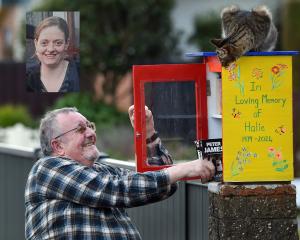Dunedin Hospital's beleaguered gastroenterology department needs greater resources to prevent more people having adverse outcomes after being denied colonoscopies, GPs say.
The WellSouth primary health network has surveyed all 83 general practices in the Southern region in the wake of a scathing independent report into issues in the department.
The survey's findings, while anecdotal, were deemed urgent enough for WellSouth to write to the Southern District Health Board with its findings.
"Nearly all respondents acknowledged having patients (or being aware of cases) where there were adverse outcomes due to denial or delays in referrals being accepted by the gastroenterology department," the letter - a copy of which was obtained by the Otago Daily Times - said.
The network survey had 32 responses within five days; there are 83 GP practices in the Southern region.
"Many GPs recounted that communications from the gastroenterology department were unusually and needlessly rude and unprofessional," the letter said.
"Belittling, scathing, condescending and offensive were among the words used to describe written and verbal communications."
WellSouth acknowledged the survey was not an in-depth one and said it would do further research.
However, its findings that GPs were having difficulties having patients accepted for colonoscopy echoed concerns expressed in a letter written by Dunedin GP Dave McKay to the SDHB earlier this week.
Dr McKay wrote that GPs were reluctant to refer possible bowel cancer patients to the department as they feared a colonoscopy request would probably be declined.
WellSouth said feedback to its survey "consistently indicated" that doctors felt they had limited access to the colonoscopy service, even in cases where they believed referral criteria were met.
"Limited access (whether real or perceived) impacts how they manage and refer patients," the letter said.
"They are managing patients through other means that they think should have colonoscopies.
"These patients are therefore invisible to the gastroenterology department ... GPs feel there is significant medico-legal risk from having to manage patients in these circumstances."
The letter said WellSouth intended to contact the Health and Disability Commissioner on behalf of GPs to express their concerns concerning adverse outcomes from declined referrals and legal risks faced by GPs in the present environment.
WellSouth said extra resources needed to be assigned to colonoscopy and gastroscopy so the momentum of the successful rollout of the national bowel cancer screening programme in the South could be maintained.
"This new programme is already reducing the incidence of colorectal cancer in the South and is the best chance of reducing colorectal cancer at a population level that we have.
"[WellSouth can assist] by continuing to champion the national bowel cancer screening programme in the Southern district ... by working constructively with the SDHB, the Ministry of Health and others and to continue our support of the general practice in Otago and Southland."
SDHB chief executive Chris Fleming said he was "disappointed" WellSouth had not spoken to the board before conducting and reporting its survey.
"It is important we work in partnership to address challenges within our health system," Mr Fleming said.
"We have acknowledged concerns relating to colonoscopy and have now invited WellSouth to nominate a GP to join the endoscopy user group to help ensure their voice is heard...
"As chief executive, I am concerned about the reports of rude, offensive letters from our service and welcome any GP to share copies of these with me if they wish."











